by Angelica | May 3, 2016
I think that to say it’s been a while would be an understatement at this point. It seems like I fell off the face of the earth, and it actually kind of feels like I did too. Since February, I completed the last 3 blocks of M2 year, studied for and took Step 1, and began M3 orientation. To say it’s been a whirlwind would be putting it lightly.
The last three blocks of the year, Gastrointestinal, Endocrine, and Reproduction, flew by. Hanging over all of them was the notion that Step 1 was on the horizon. At this time, I found it more important than ever to stay focused because I wanted to make sure that I was in a good place once the dedicated study period for Step began. Before I knew what happened, I took my last exam of M2 year and had approximately 6 hours to celebrate before Monday came and study period began (Sunday quizzer life).
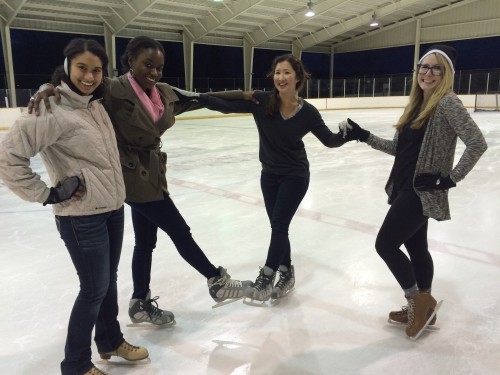
Quick ice skating break during the last few weeks of school. In case med school doesn’t work out…
I’m not sure that there are words that can adequately describe study period. There are so many emotions that occur during that 5-6 week period (which doesn’t feel like nearly enough time to relearn/review everything you need to know). I went through moments of elation and moments of complete and utter doubt. There are few times in my life that I’ve felt quite so humbled as when a question set absolutely destroyed my confidence. Yet at other times, the work that I put into studying over the past two years shined through. Studying for Step 1 is a process.

Getting ready for a day of Step studying
Before I started studying for step 1, people kept telling me it was a rite of passage. I didn’t understand how a test could be a rite of passage, but now I definitely get it. Step 1 is all about discipline and learning how you learn best. It’s about finding just how much information you can cram into your head without driving yourself crazy in the process. It’s about experiencing every emotion in the human spectrum because it’s impossible to know absolutely everything going into test day. Step is a mind-bending experience. When I walked out of the test center that day, all of the emotions hit again: the confusion, the anxiety, the trepidation, but most of all, the relief that it was over. I won’t know how I performed on the exam for several weeks, and while I’m trying not to think about it until then, I realize that the simple act of taking Step 1 is an accomplishment in itself.
Now that Step 1 is over, a new kind of excitement has taken over: M3 orientation. Orientation began on Monday and will continue for the rest of the week. It’s the last thing that stands between the newly minted M3 class and the wards. I have to say that I’m really excited about what is to come. When I picked up my pager yesterday, things finally started to seem real. I can’t even believe that in a few days, I’ll see my first patient as an M3. I’m nervous and excited, and I just can’t wait.
As always, thanks for reading. Until next time, it’s back to training modules and preparations for the wards!
by Stefanie | Apr 27, 2016
It feels like it’s been approximately a gajillion years since I last wrote (and, upon checking the date, it nearly has been that long. Oops?)
Life got a little crazy. Like, Step 1 crazy. Yeah – that happened. I took the test two days ago and it already feels like it was in a past life. It’s AMAZING (and kind of terrifying, truly) how 5 weeks of insane studying and preparation passed in the blink of an eye. I shudder to think of how many hours I spent sitting in front of First Aid (aka the Step 1 Bible)… which is why I choose not to! 😀 Aside from the constant presence of terror lurking over my shoulder (the test is coming the test is coming the test is coming), the whole process was actually sort of rewarding in a twisted (masochistic?) kind of way. It really hammered home the sheer volume of material we’ve covered in less than two years’ time and, though many, many things were forgotten (and forgotten again and then again just for good measure), many more were still remembered. If nothing else, the fundamentals have been beaten into me enough at this point that when I have to look up what exactly is going on with Trendelenburg gait (I always remember superior gluteal nerve and abduction, but you ask me to explain it and I go, “Uh…..”), I actually understand the explanation. Med students: the best Googlers in the (mid)west.
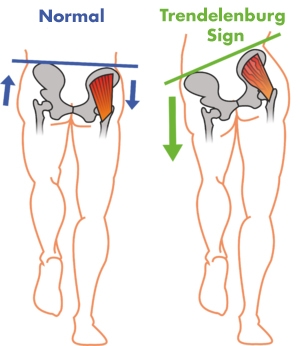
It’s, like, angles! And – and lever arm! PHYSICS! (It’s always physics.)
In my test-induced haze, I truthfully have no idea how I did, but I definitely didn’t walk out of the testing center feeling like I needed my mommy to hold me – which is how I anticipated myself feeling when all was said and done. I’ll take it.
Immediately after finishing the test, I had to tackle the epic amounts of paperwork and online training required by the VA hospital because I was insightful enough to schedule my test on the due date of said paperwork. It’s not like I was going to take any time from studying to do it, so I obviously hadn’t even touched it up until that point. It proved to be a time-consuming task, as did coaxing my mother’s printer/scanner to cooperate with me. In other words, the fun didn’t stop until late in the evening. Now, however, I’ve finished up most of the things that have been collecting dust on my to-do list during the study period and it evokes a feeling that defies description. I’m actually able to take enough time out to contemplate the fact that my classmates and I will be starting M3 orientation in… 5 days? Yikes. I actually went and ordered textbooks for my Internal Medicine rotation on Amazon yesterday morning because, yeah, I’m a school supplies nerd. (I know you’re all flabbergasted at this revelation.)
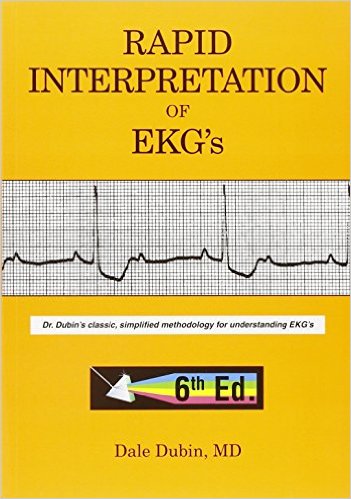
Dubin and I are gonna be TIGHT.
I’m both nervous as all get out and so stinkin’ excited to get started. For the moment, however, I’m more than content to stop and take a few moments to just be. Also, video games.
by Sara | Apr 12, 2016
As medical students, it feels like we are always in training. After all, we don’t have our MD’s yet, and even then we still train during residency. At the moment, it seems like we always will be in training…that’s why it’s called the “practice of medicine,” right?
Lately, some of my fellow students have begun another type of training – for the Dexter-Ann Arbor 5k, 10k, and Half-Marathon that takes place in early June. In addition to being a beautifully scenic route, this race is quite popular at UMMS. (And it’s not just because the Office of Medical Student Education historically pays our entrance fees to promote fitness among students) and that popularity may even grow as a result of the new house system.
This year has marked the introduction of M-Home, where students and faculty alike are sorted into houses, now called Fitzbutler House, Salk House, Hamilton House, and Sanford House. Each house then hosts events to promote cross-class mingling and collegiality. For example, my house (Fitzbutler) has played Quidditch and even whirlyball in friendly rivalries against other houses.
Now, we are going to begin training for the Dexter-Ann Arbor run together. We started with a seminar about exercise physiology (some of the material was similar to that in coursework but with practical applications) and soon the training runs will start.
In my case, I will probably pass on this additional training this year. Why? Well, I completed my first half-marathon about a week ago (Ann Arbor Half-Marathon) and followed that up with the Trail to the Victors Big House 5k a few days ago. I might hold off from racing for a bit longer, but I definitely want to do another one in the future.
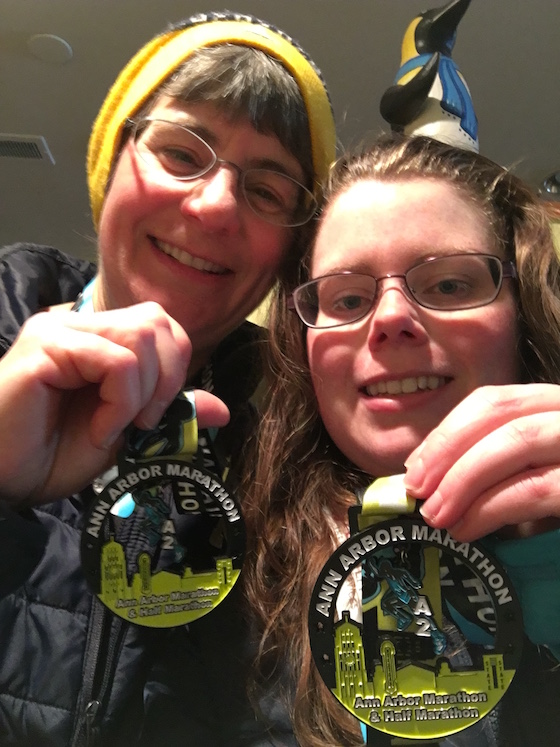
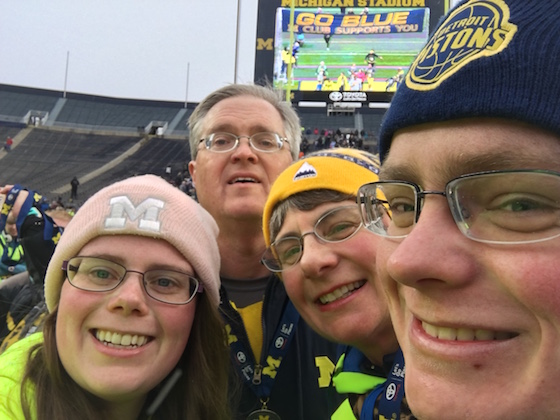
My mom did the half-marathon with me; my whole family did the Big House 5k.
by Nonie | Apr 9, 2016
It really felt like Spring Break could not have come at a more opportune time. Many of my classmates, including myself, were ready for a change after our unit on the central nervous system. The brain is fascinating, but there sure are a lot of parts to memorize! The nuclei, and tracts, and many specific anatomical features in the head and neck can seem never-ending. After CNS, we had a week of practicing our diagnostic skills during Chief Concern week, and then we were finally off to Spring Break.
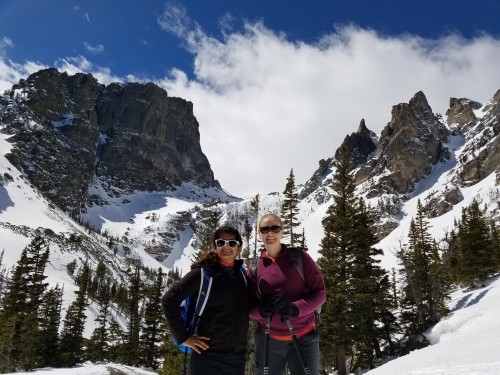
Beautiful hike over packed snow
I spent the first half of break in Colorado with one of my college roommates, Martha. We spent a few days in Boulder and in Denver and had a chance to hike up the Flatirons and across frozen lakes and up mountains in Rocky Mountain National Park. The experience was exhilarating. I had never been that high up on a mountain before! The panoramic views were incredible and I just couldn’t contain my excitement. It’s amazing how much better food tastes, too, after spending all day moving.
Now that break is almost over, I feel so much more refreshed and ready to head back into a stretch of intense learning. (I wish my ears would catch up though; they have yet to equalize the pressure correctly post-mountains. After CNS I can picture exactly what my Eustachian tube needs to do to re-equilibrate). The M1s are starting the infectious disease sequence on Monday, which I have heard great things about. You know a class has to be good if the upperclassmen have made T-shirts with the professor on them. After this trip, I’m also a lot more motivated to keep up with a rigorous exercise routine so I can take on harder hiking and climbing routes this summer. Here’s to new challenges, warmer days, and staying mentally well in this last stretch of the semester!
by Joy | Apr 8, 2016
I can recite enzymes involved in nucleotide biosynthesis, identify the sternohyoid muscle or ilinguinal nerve on a cadaver, tie a square knot, and list pithy acronyms for expressing empathy, but in some ways I still curiously feel like the more I learn, the less I really know.
In his book “Being Mortal”, Atul Gawande suggests that “[we] become a doctor for what [we] imagine to be the satisfaction of the work, and that turns out to be the satisfaction of confidence.” As an engineer, I was drawn to the challenge of solving difficult, intricate problems and the seemingly precise logic of medicine that clinical diagnoses entailed. And while medicine is certainly complex, I have discovered in my limited training that it rarely is so neat and tidy. Even in the comfort of my apartment while studying, I struggle at times to learn the nuances between what seem to be similar presentations. It is daunting to imagine that in a not so distant future, I will need to do the same in front of a patient who expects an actual diagnosis.

Being a pre-clinical student especially in the first year of med school is kind of like being an honorary member of a team in the sense that we probably are not contributing much but are included anyways. I often know just enough to realize that there is still a lot that I do not know. It’s a lot like when you hear the first part of a question and think you know the answer only to hear the second part and realize that you only know half the answer. In the hospital, I hear of diseases like cystic fibrosis and excitedly think “it’s a defect with chloride channels” only to deflatedly realize that while I can describe the genetic mutations that result in the disease, I know little on how to go about treating the patient. And yet maybe that is ok.
I was watching Z as she was making a butterfly out of fuse beads as part of her occupational therapy while at Mott’s Children Hospital. Z was a sweet and energetic thirteen year old girl that had fractured her tibia, fibula, and pelvic bones from a car accident and after 3 months in the hospital, she was to be discharged from the hospital the next day. As she finished her session with the occupational therapist, she said, “I’m thirsty”, but at that point the occupational therapist was more occupied with helping transport her to her session with the physical therapist. As the therapist began packing Z’s belongings, I walked to the water jug dispenser, filled a cup of water, and handed it to Z in the wheelchair. “Thank you”, Z said smiling at me. I couldn’t help but think that I was glad to be of use.
As observers, we have the unique ability to watch without being tied to specific responsibilities. This is a privilege in some ways because at some point in our careers, I imagine we will be saddled with numerous responsibilities and time will become a luxury that we do not have. To pass time, at times I’ll find myself chatting with patient families and the healthcare provider. “How old is she”, I asked the great-grandmother of one such patient. “Two”, she replied as A, the 2 year old patient, adorably crawled on the floor searching for tossed coins as part of her physical therapy. As I conversed with the family member, I learned more of the diagnosis, but also was able to ask clarifying questions to the physical therapist. This sparked further questions from the great-grandmother, who was then able to learn more about appropriate follow up treatment and rationale for the plan.
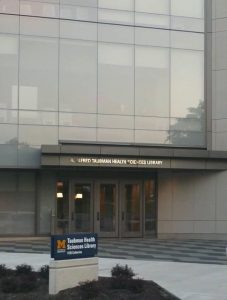
In the moment of things, I often question my ability to contribute meaningfully in clinic. “What do I really know” I will doubtfully ask myself. But in thinking back on experiences, I realize that sometimes it is in the small things that I can assist in –I can help advocate a bit for patients and their families by helping to ask questions and to provide an extra set of hands when a care provider is busy. These are small things, perhaps barely perceptible, but I like to think that I am helping in some small way.
I tend to think of medicine as a scientific endeavor, but if I really think about it, a good doctor is equally defined by both clinical expertise and people skills such as communication and empathy. I remain confident that somewhere along the way at a place as great as Michigan I will develop the technical expertise. And at this stage while I am still building clinical skills, perhaps it is ok that I don’t know the answers to everything – I can practice in the softer doctoring skills that are perhaps just as important or even more than nucleotide biosynthesis or locating a nerve.
*patient details modified to protect confidentiality
by Nonie | Mar 18, 2016
In my last post, I promised an update on the advocacy efforts of our student chapter of the AMA, and I have many developments to report! In February, we hosted a seminar where students had the opportunity to learn from Dr. Sharon Swindell and pediatrics residents about how they advocate for patients. It was inspiring to hear stories about how their actions have improved the lives of their patients even beyond the medical realm. In particular, Dr. Swindell presented a pyramid chart on the different levels of advocacy that really resonated with me. The base was built upon advocating for one patient/family at a time, with the next level as office-based family advocacy services, followed by community advocacy through programs like CATCH grants, and finally legislative advocacy. Each physician can choose to be part of any or all levels of advocacy for patients.
Even before medical school, I would have considered myself a pragmatist. Now, even more so, I believe in the power of incremental positive change. I had the chance to be a part of that this past week at an advocacy and region conference of the AMA in Washington, DC.
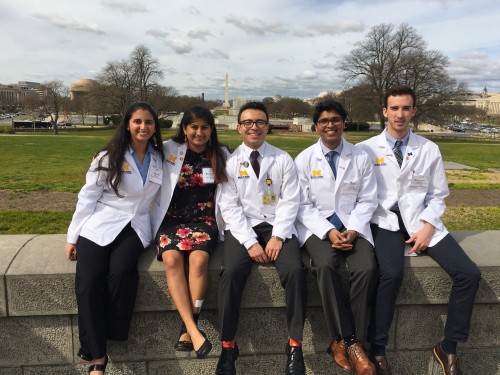
University of Michigan delegation to advocacy conference in Washington DC
I felt well prepared to speak with legislators and their staffers after previously attending Washtenaw County Medical Society legislative update meetings and trainings through the AMA conference. The issues that we focused on on Capitol Hill were public service loan forgiveness programs and protecting graduate medical education funding. Personal stories have the power to influence the actions and votes that our representatives in Congress take! It is both a privilege and a responsibility to make our voices heard as medical students.
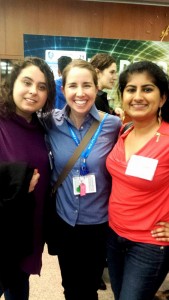
At the Intel Science Talent Search poster presentation with Michelle Hackman and Caitlin Sullivan
In DC, I also had a chance to attend my favorite science fair, the Intel Science Talent Search, with friend and fellow STS 2011 alum, Michelle Hackman, and it was great to reminisce and see all of the fascinating projects presented by current STS finalists. And, I still managed to make time for some March Madness and see my alma mater (Duke) play in the ACC conference in DC.
I had just taken my missed quiz after the conference when I was called in the middle in the night and found out that the pregnant patient I had been following since October was in labor! I was so excited that I arrived at the hospital several hours before needed and was able to be a part of two deliveries. I am so grateful to those patients for allowing me the privilege to participate in and learn from that important moment in their lives.
Time to return to memorizing tracts and nuclei for the current M1 CNS sequence.











